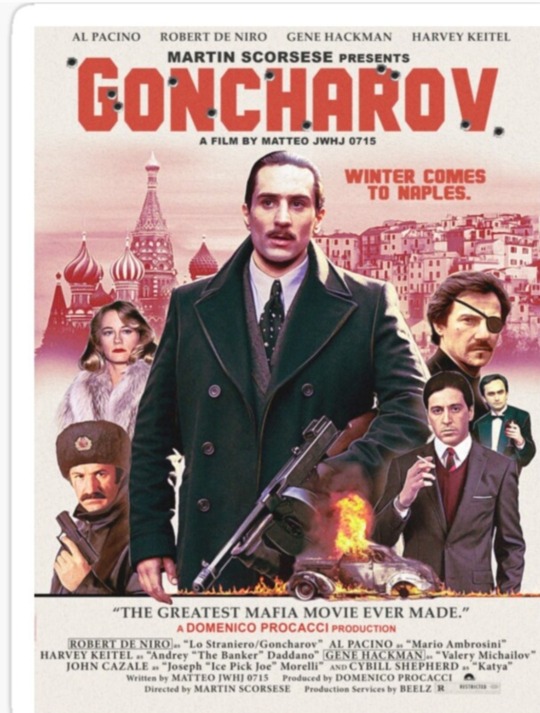Text
Langblr Reactivation Challenge
Hello everyone! As you may know I've created this challenge to help revive the langblr community. It's a three week challenge designed to get you back into learning languages and (hopefully) give you ideas on how to study and share your knowledge of them. It is completely optional to do, but try to reblog other people's posts if you aren't participating.
The challenge is designed to be done daily, however if you miss a day, you can go back and do it later or continue from where you left off. I do encourage you to do your best to keep up with the challenge though. Tag your posts with #langblr reactivation challenge so that others can find your posts.
If you have any questions, please send me an ask or a message and I'll do my best to answer it.
I'll put the prompts under a read more so this post isn't ridiculously long. Good luck to everyone participating! Remember the best way to promote the langblr revival is by reblogging other people's work.
Week 1
Day 1: Create an introduction post about yourself. What's your name? What languages are you studying? What languages do you hope to study? What do you hope you'll get out of this challenge? Add whatever else you’d like to your introduction post!
Day 2: Write a list of goals you have for your target languages. Make both long term and short term goals. An overall goal could be to have the ability to talk with native speakers with ease and a smaller goal would be to finally learn that difficult grammar point that's been plaguing you for ages. How will you achieve them?
Day 3: Create a list or a Mindmap of vocabulary topics. Start with a broad topic and narrow down to more specific topics. An example could be bedroom - furniture - closet - clothes or travelling - languages - study words - school supplies. Keep a hold of this because you'll use it later to create vocab to study. Some broad topics to start with: house, school, work, travelling, friends and family, nature, city. Feel free to use these or think of your own. Share your mindmap so others can get some ideas if they need it. Here are some mind map creation tools (x) (x) (x).
Day 4: Create a vocab list for one of the topics you created yesterday, if you want to make more, feel free to make as many as you like! Share your list and reblog other people's lists. And most importantly, make sure you study these words!
Day 5: Find a video in your target language and watch it as many times as you need to in order to understand it. Make a post about the video. What was it about? Did you like the video? Was it difficult to understand? Make sure you link the video. Try to write your answers in your target language, but if you can’t that’s okay!
Day 6: Look up 3 idioms in your target language and explain what they mean and how you use them in a sentence (with an example!).
Day 7: Send asks to other langblrs (bonus points if it's in a shared target language!) asking them about whatever (for example, ask how their day was, ask questions about their target languages, or share some of your thoughts with them). If you receive one, answer it! You can ask more than one person and it can be on or off anon.
Week 2
Day 1: Over the next week, create a playlist/playlists of songs in your target language(s), they can either have a specific mood or genre or they can be a collection of songs you've discovered. When you feel like you're done with your playlist, share it so others can find some new songs. If you already have a playlist, you can add songs to it and update it.
Day 2: Write an explanation on a grammar rule in your target language (such as verb tenses, exceptions, word order, etc). Include sentences to show how and when it is used.
Day 3: Either make a vocab list or find a vocab list you like and make sentences using those words. You can make them as long or as short as you like. This is a good way to contextualise vocab words and learn them in context. Share your sentences and highlight the vocab word.
Day 4: Record yourself reading an article, short story, or passage (basically anything written in your target language). Listen to it and see if you can point out any areas you can improve with your speaking and any areas that you're doing well. You can post your recording if you wish.
Day 5: Post at least 2 songs that you like in your target language. Make sure you add a link to them so people can go listen to them.
Day 6: Share a study tip you have. This can range from how you organize your notes to playlists that help you study to apps you use to review. Just something that you find makes studying easier (and more fun).
Day 7: Share with everyone some langblrs you enjoy seeing on your dash, try to put at least 5 people (and make sure you @ them!).
Week 3
Day 1: Remember that playlist you made/are making? Take a song you really like and make a vocab list of words you don't understand, learned from the song, or recognize but don't quite remember. Post so others can see and link the song. If you have extra time and/or want a bit more of a challenge, translate the song as well, either into English or another language.
Day 2: Write about a festival or holiday that is celebrated in a country that speaks your target language. This can be either something you’ve celebrated yourself, have wanted to participate in, or have never heard of before. You can write this in any language you’d like.
Day 3: Make another vocab list from the list you made at the beginning of the challenge. If you are learning two or more languages, make the vocab list in 3 languages (meaning for example: French, German, and English or Japanese, Arabic, and Ukrainian).
Day 4: Find a recipe written in your target language and translate it into your native language (or another language of your choice) or find a recipe in your native language and translate it into your target language. Bonus points if you actually make it (share pictures if you do)!
Day 5: Create a collection of resources you use to study/learn your target language. Add links to them if possible so others can also use them.
Day 6: Create a post explaining a grammar rule that you had/are having difficulties learning. If you’re currently having difficulties, do your best to explain and ask others to help you understand it better. Include example sentences in your explanation.
Day 7: How do you feel at the end of this challenge? Did you meet any goals while doing this? Do you feel more confident in your language abilities? Where do you think you'll go from here? Answer these questions either in your native language or your target language.
Hopefully you guys enjoy/enjoyed this challenge. After you've completed the challenge, I encourage you to continue your studies in your target languages and support others in theirs.
739 notes
·
View notes
Text
“Musk’s egomania drove him to buy and inevitably ruin Twitter because he hoped to transform it into X, his totalitarian “everything app” WeChat clone he wanted to send us to space with. But there is another, simpler narrative here. A man who grew up in apartheid South Africa, whose family owned a diamond mine, who made his name helping cyberlibertarians bypass banking laws, manipulating the US tax system to build faulty self-driving cars, and shooting rockets into space in the hopes of establishing debt slavery on Mars, bought an app built by activists and Black Americans, and that is relied on by the Global South as a valuable democratic tool, and is used by journalists around the world as a free and open source of information, and tried to turn it into his personal country club. This is just the mundane nightmare of watching a wealthy man wreck his new plaything — an imperfect, but vital communication system for some of the most vulnerable and marginalized communities in the world. This is a colonialist doing what colonialists do. And I hope that when this embarrassing circus is over, we can figure out how to build something back that someone like Musk can’t turn into his new diamond mine.”
—
One giant slow-motion fail whale
This is a colonialist doing what colonialists do.
This is a colonialist doing what colonialists do.
This is a colonialist doing what colonialists do.
This is a colonialist doing what colonialists do.
This is a colonialist doing what colonialists do.
This is a colonialist doing what colonialists do.
8K notes
·
View notes
Text

Hanif Abdurraqib, On Seatbelts and Sunsets
https://www.triangle.house/hanif-abdurraqib-on-seatbelts-and-sunsets
8K notes
·
View notes
Note
What’s your opinion on the Duolingo Gaelic course? I tried starting it after starting Irish and found the Gaelic 🏴 lessons to be considerably less…polished? in my experience
Excellent question!
Personally, I think it’s a great way to reintroduce a new, younger generation to the language. It covers a lot of cultural topics that many people may never have heard of, like the concept of a Mòd gathering. Additionally, I don't think I had ever heard of IRN BRU, but it’s now on my bucket list to try. (Their adverts alone are, um, quite attention-grabbing.)
According to an article in The Scotsman, as of this March (March 2022, that is - greetings, future readers!), the course has surpassed a million learners, an astounding leap for a language that just decades ago was teetering on the edge of extinction.
And back to the first point, an article in The Guardian made an excellent point about this course helping to dispel the "Scottish cringe", a manifestation of a wider (practically global, though there are exceptions) phenomenon of perceived inferiority of a given indigenous culture in favor of an external, more politically or socially dominant culture or language.
THAT BEING SAID, however, I do have some critiques of my own, and you put forward a good point. From what I understand, the course mainly teaches the Mid-Minch dialect of Scottish Gaelic (shoutout to Sabhal Mòr Ostaig!), with some regional variation in pronunciation between the people providing audio recordings (although they do expose the learner to Canadian Gaelic with a few lessons, which gets a big "thumbs up" from me). With the massive volume of learners coming to the app (an overall very positive thing!) to learn the language, I'm predicting the language will undergo a "dialect levelling" over the next few decades as a result of the popularity of this course. My guess is that the good majority of people learning Gaelic online will start and finish their language learning journey with the Duolingo course and not seek out other resources (or even fellow speakers or learners) to supplement this, which may move Gaelic towards one standard "Duolingo dialect" in the near future if care is not taken to avoid such a fate.
Another thing I've noticed is that as I near the end of the course (I'm on Unit 66 of 69 at the moment), there hasn't been a single prompt for the past fifteen or so units that I haven't already seen. Don't get me wrong, review is always good, but I do wish they would provide more variation in their prompts in the later stages of the course so I could be sure that I'm absorbing more essential vocabulary and grammar and not just drilling myself on Duolingo sentences. I also wish it would cover some more important points of grammar and vocab earlier in the course (concepts in colloquial sentence structure such as how and when to use phrases like "air a bhith", "gum bi", "biodh", etc.). My advice once you've reached about Unit 45 or so is to begin seeking out other learners (or native speakers if you can find them) and begin practicing using the language in a more colloquial fashion.
One note I have about the platform in general: a somewhat common thread among Duolingo learners of any language is that the sentences sound unnatural at times, or that they'll "never use these sentences in real life." While that may be the case in a literal sense, that's not the whole point of the structure of the courses. I think people see sentences like "the bear gave me a strawberry" and think they're not learning anything worthwhile, but what sentences like this teach you is vocabulary in different syntactical situations. This is one of the best ways to learn grammar - that is, to not even realize you're learning it, and to passively absorb it based off of various usage examples. After all, this is how we learn grammar rules as young children! And a side-note, make sure you do the lessons with the sound on, and for your own sake, make sure you're saying each sentence out loud as you go! (Your future conversation partners will thank you for it.)
I also forgot to mention a great resource in my main post - the show Speaking Our Language is available on YouTube for free (at least in the United States), and covers Gaelic as it may be used situationally. It can be a bit goofy at times, and it's a nostalgic snapshot of early- to mid-1990s Scotland, but it's presented in a very digestible and well-paced fashion for learners!
Follow for more linguistics and share this post! If you have any questions, feel free to ask!
64 notes
·
View notes
Text
SpeakGaelic: a guide!
Sabhal Mòr Ostaig, the national centre for Gaelic language and culture, recently worked with BBC Alba to produce videos, audio and a website called SpeakGaelic.
There’s videos, an online course, support for tutors, multiple new podcasts, Youtube, various things airing on TV. The actual self-taught online course is only one part of how much this resource has to offer! So here’s some of the things I’ve been looking at.
1. The website itself
https://speakgaelic.scot/all-online-courses/
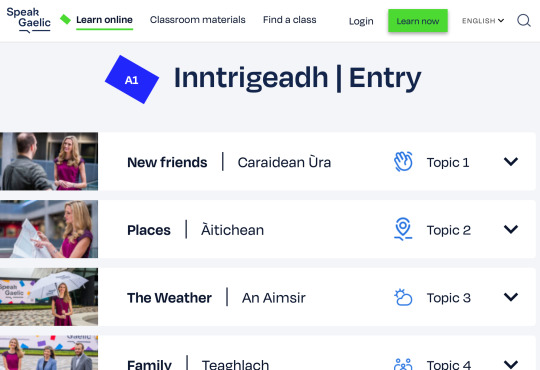
This is just the whole website: explore at your leisure! At the moment they have finished up to around A2 level, and are working on producing higher level content.
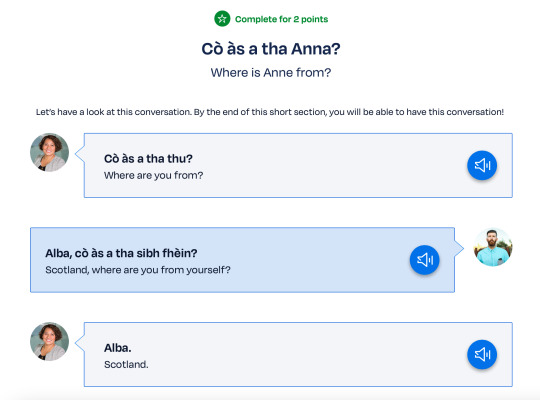
Each topic has a series of 8-10 mini-lessons that are sometimes more duolingo style, and sometimes with videos.
I…actually prefer to use the teaching resources for tutors (linked below) than this course for a few reasons. My main problem is that the vocabulary they present to you is far too fast (in one lesson they might give you 20 words for different Scottish towns), which is fine if you just need to choose the relevant words for where you are from, but in order to pass the quiz to get to the next level you have to get ALL of them right. And Gaelic spelling takes a while to get used to…
There’s also no writing / spelling practice, but to pass the level requires you to write things. Which. Feels counterintuitive! You can learn any level without passing the tests, but it’s annoying because it means your progress isn’t saved to an accurate place. I emailed them about it and got a friendly response back, but this isn’t something they are planning to change.
2. The classroom materials
https://speakgaelic.scot/classroom-materials/
Now THIS is where it gets exciting. These are materials designed in theory for tutors - full lesson plans, worksheets, everything - but they are accessible to learners too. In fact, I think they’re much better than the online course.

Why? Because everything is STRUCTURED. You are given practice, and told what to do, and there are grammatical explanations. (NB: all of these exist in the online course, but not in one handy document for you to look over in one place.)
You have all of the learner content….
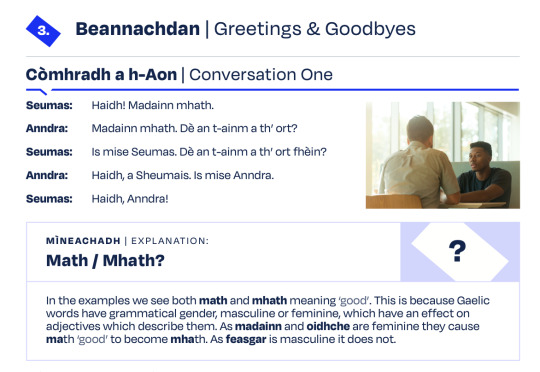
…and you ALSO have teacher content:

‘If learners need more time and practice with the vocative case’ > that’s me! And it shows you then exactly what you should do next. Whereas the online course doesn’t have that option for customisation at all. Most of the worksheets are included in the lesson plan, and some are on the main page. Absolute bliss.
3. The SpeakGaelic learner podcast
https://open.spotify.com/episode/6x5b901Zj8ky0UsMM4SzZM?si=00c361fe5ffc4f0d
(If you don’t have Spotify, you can just search ‘SpeakGaelic’)
This is an audio version of the lessons above, and goes into more detail - with information from three different native speakers - into some of the grammar things that the course doesn’t really cover in that much depth. There’s conversations you can listen to, and it’s all targeted at complete beginners. If you listen to any other Gaelic podcasts you’ll recognise the presenter, John Urquhart!
After each episode, there’s also a special episode - scroll down to the bottom - with conversation about different topics relevant to the day’s lesson with two of the presenters. Great for providing extra information!
4. The Youtube channel
https://www.youtube.com/watch?v=ppoHU_ece7o&list=PL_U7jPRkbJZtFegaqKKT8MrZnV7ugwHAG&index=1
Ok, so there’s a LOT of content here. First you have the A1-A2 lessons, around 30 minutes each. Despite what the name suggests, these are not the same as the audio podcasts. They have Joy (who presents the online course) but they also give some extra video clips and information about cultural things too!

They’re a little slow, but a good supplement to the material given above. As far as I can tell, there are only 13 of this particular series (and 13 for A2) but the YouTube channel SpeakGaelic itself has hundreds of episodes of everything that goes into the online course. All the videos can be found there.
This includes all audio and conversations, as well as snapshots on individual learners and some cultural information.

They also seemingly have started marking some grammar videos! Check out this playlist for more grammar: https://www.youtube.com/watch?v=Pq9_0ht4L3Y&list=PL_U7jPRkbJZu0uq_6wpzCgZcpddGDU76D
5. The intermediate podcast: Beag air Bheag
https://open.spotify.com/show/34wGOU9sDTE7Vzg0qMexfv?si=314cbbb294b648ec
Once you’re a little further on in your journey (I…can’t understand these yet), there are a few other podcasts on Spotify also by the BBC Radio nan Gàidheal. This is one! This is totally in Gaelic, but spoken fairly slowly and designed for intermediate learners.
6. The old site: learngaelic.scot
https://learngaelic.scot
Check it out! I…actually prefer this site and the way it teaches. It has some bonuses over the old one - good vocabulary sections, plus a really great directory of Gaelic courses online and in person, as well as a dictionary, and so on.
It goes all the way up to B2, so is a better choice if you have more than a little Gaelic.
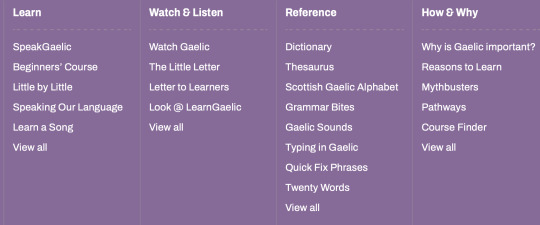
It’s also a brilliant directory of media in Gaelic - you can watch lots of videos with transcripts in Gaelic with a dictionary, as well as finding native-level material. You can sign up to their newsletter and get weekly Gaelic information too.
It also has links to Speaking Our Language!! Which is an absolutely wonderful resource from the 90s teaching Gaelic one conversation at a time, and also goes up to a fairly high level. These are all updated for The Modern Age: i.e., they all have PDFs and transcripts, as well as links to the grammar points for whatever lesson you’re listening to. Far more advanced than anything the new site currently has.

I might do another post once I’ve explored this website a little more!
7. Bonus: Gaelic with Jason
Finally, one extra! The other main resource I’m using is Gaelic with Jason (https://www.youtube.com/watch?v=5rAE_iLRh4g for example).

He has a whole bunch of free Youtube videos, but I’m actually doing his paid online course - it’s by the best value for money I know from any course, Gaelic or otherwise. If you have the money for it and like immersive learning with a board and just being chatted to, I’d highly recommend you give it a go. He also has loads of Gaelic books for learners, which are wonderful too, and a folktales and traditions course for intermediate learners. Can’t talk about this man enough. (https://gaelicwithjason.thinkific.com)
—
Once again, I’d really encourage you to check out the teaching materials: I personally find them way more useful than the online course for learners specifically. I’m looking at the teaching materials in conjunction with the audio on YouTube and then the podcasts on Spotify.
All the best!
- Melissa
663 notes
·
View notes
Photo









#langblr#language learning#language vocabulary#days of the week#languages#polyglot#multilingual#language vocab#studyblog#langblog#studyblr#gaelic#scottish gaelic#study with me#study notes#study motivation#i am FINALLY coming around to canva but hm. not too sure. i'd like to make stuff myself but im not v competent w that
15 notes
·
View notes
Text

- Jackie Kay, from Bantam.
9 notes
·
View notes
Text
verbs, part v
stealing, a’ goid keeping, a’ cumail talking / speaking, a’ bruidhinn learning, a’ ionnsachadh reading, a’ leughadh writing, a’ sgrìobhadh walking, a’ coiseachd running, a’ ruith swimming, a’ snàmh sleeping, a’ cadal
6 notes
·
View notes
Text
verbs, part iv
wanting, ag iarraidh working (in), ag obair (ann) living in / staying in, a’ fuireach ann an/am buying, a’ ceannach seeing, a’ faicinn hearing, a’ cluinntinn feeling, a’ faireachdainn understanding, a’ tuigsinn getting / finding, a’ faighinn doing / making, a’ dèanamh
8 notes
·
View notes
Text
verbs, part iii
from, à i am, is mise i have...on, orm i have, agam (at me) to have, aig i need, feumaidh mi you need, feumaidh thu
12 notes
·
View notes
Text
verbs, part ii
i like, is toil leam i do not like, chan toil leam i would like, bu toil leam i would not like, cha bu toil leam i know, tha fios agam i do not know, chan eil fios agam
3 notes
·
View notes
Text
verbs, part i
to be / is, tha to be not / is not, chan eil isn’t, nach that is..., sin this is... / here is..., seo i am here, tha mi an seo i am there, tha mi an sin
3 notes
·
View notes
Text
#1monthoflangs
day two, basic sayings
thank you, tapadh leat / tapadh leibh (formal) welcome, fàilte i am sorry, tha mi duilich excuse me, gabh mo leisgeul. brilliant, sgoinneil bye, tìoraidh
#1monthoflangs#language#langblr#language learning#learning languages#studyblr blog#study notes#bilingual#multilingual#languages#scottish gaelic#gaelic#basic sayings#vocab#language blog#language vocabulary#vocabulary
11 notes
·
View notes
Text
#1monthoflangs
day one, goals for the month
to finish at least chapters for my greek text book and to cross checkpoint #2 on duolingo for gaelic but mostly i want to practice greek and gaelic more consistently.
hello!! i am back! v sorry for abandoning the blog entirely but training and languages were v difficult to balance and i think i am finally in a position to do better so here i am.
#1monthoflangs#langblr#language learning#languages#studyblr blog#studyblr#langblog#polyglot#study motivation#study inspo#study with me#bilingual#multilingual#study notes
2 notes
·
View notes
Text
hii sorry I haven't been posting at all BUT I have been working on something and hopefully y'all will like it!!
#langblr#langblog#language learning#multilingual#polyglot#studyblr#ITS OK IF U DONT NO PRESSURE BUT I RLY HOPE Y'ALL DO COS IM VV EXCITED
3 notes
·
View notes
Text
#100daysoflanguages (dutch)
day five, memorize a poem
onze ziekten / our diseases
poet: anne vegter, 2020
translator: florian duijsens, 2021
zoals ik kan schrikken van een stopbord zie ik onze overeenkomsten:
just as i can startle at a stop sign i can see our similarities:
wij het project zonder ziekten, ik als afbeelding: jij die mij omlijnde
we the project without diseases, me as an image: you who delineated me
het zijn niet steeds de keerlingen die het verschil maken, ook wij,
it’s not always the converts that make the difference, we, too,
in ongemakkelijke thuissituaties, vragen naar de scheidslijn tussen
in uncomfortable domestic settings, ask about the boundary between
stem en verlangen, die ons heeft verdeeld, ons heeft verjaagd,
voice and desire, that divided us, chased us off,
ons uiteengedreven, de weg verlegd van middendoor naar buitenaf
scattered us, diverted the road from the center to the outside
en dat werd onze ziekte, maar je springt als een naakte big, je springt
and that became our disease, yet you jump like a naked piggy, you jump
als een prijs, je bent ontvangen en je laat de laatste ziekte aan mij
like a prize, you’ve been picked up and you leave the last disease to me
(dutch poems are v hard to find but god is this one so good)
#100daysoflanguages#langblr#language learning#study break#language vocab#study blog#langblog#polyglot#studyinspo#multilingual#bilingual#vocab#poetry#poems#dutch#nederlands#study nursing#study with me#study motivation#anne vegter#florian duijsens
5 notes
·
View notes

